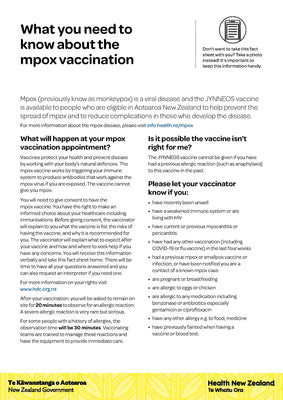What you need to know about the mpox vaccination - HP8578

Information on the mpox vaccination
The full resource:
Mpox (previously known as monkeypox) is a viral disease, and the JYNNEOS vaccine is available to people who are eligible in Aotearoa New Zealand to help prevent the spread of mpox and to reduce complications in those who develop the disease.
For more information about the mpox disease, please visit info.health.nz/mpox
What will happen at your mpox vaccination appointment?
Vaccines protect your health and prevent disease by working with your body’s natural defences. The mpox vaccine works by triggering your immune system to produce antibodies that work against the mpox virus if you are exposed. The vaccine cannot give you mpox.
You will need to give consent to have the mpox vaccine. You have the right to make an informed choice about your healthcare including immunisations. Before giving consent, the vaccinator will explain to you what the vaccine is for, the risks of having the vaccine, and why it is recommended for you. The vaccinator will explain what to expect after your vaccine and how and where to seek help if you have any concerns. You will receive this information verbally and take this fact sheet home. There will be time to have all your questions answered and you can also request an interpreter if you need one.
For more information on your rights visit www.hdc.org.nz
After your vaccination, you will be asked to remain on site for 20 minutes to observe for an allergic reaction. A severe allergic reaction is very rare but serious.
For some people with a history of allergies, the observation time will be 30 minutes. Vaccinating teams are trained to manage these reactions and have the equipment to provide immediate care.
Is it possible the vaccine isn't right for me?
The JYNNEOS vaccine cannot be given if you have had a previous allergic reaction (such as anaphylaxis) to this vaccine in the past.
Please let your vaccinator know if you:
- have recently been unwell
- have a weakened immune system or are living with HIV
- have current or previous myocarditis or pericarditis
- have had any other vaccination (including COVID-19 or flu vaccine) in the last four weeks
- had a previous mpox or smallpox vaccine or infection, or have been notified you are a contact of a known mpox case
- are pregnant or breastfeeding
- are allergic to eggs or chicken
- are allergic to any medication including benzonase or antibiotics especially gentamicin or ciprofloxacin
- have any other allergy e.g. to food, medicine
- have previously fainted when having a vaccine or blood test.
How many doses are required?
It is recommended to have two doses, minimum 28 days apart. One dose gives good protection from severe disease. Protection starts two weeks after your first dose. Ask your vaccinator how you can book the next appointment.
Will the vaccine stop me from getting mpox?
Some people can still develop mpox after the vaccine, but their symptoms are generally milder and there is less chance of serious complications. It is important to understand that you will still need to take steps to avoid being exposed to mpox even after your vaccination. The mpox vaccine is made from the same family of viruses that cause smallpox and mpox. The vaccine cannot give you smallpox or mpox.
Can I receive the vaccine if I am pregnant or breastfeeding?
There is limited data on the use of mpox vaccine during pregnancy and when breastfeeding.
Administration of mpox vaccine during pregnancy and breastfeeding should only be considered when the potential benefits outweigh any potential risks to the mother and baby. You can discuss these with your vaccinator or doctor.
Recording your vaccination
The vaccination event will be recorded on the Aotearoa Immunisation Register (AIR). Only people who have been authorised have access to these vaccine records. The privacy statement for the AIR can be found here tewhatuora.govt.nz/air-privacy
After your mpox vaccination
As with any vaccine, you may experience some reactions. Most reactions are mild, do not last long and happen in the first few days after getting the vaccine.
Common reactions may include local injection site reactions (pain, redness, swelling and hardening), headache, feeling tired, nausea and chills.
Current evidence does not indicate there is an increased risk of serious reactions, including myocarditis or pericarditis.
Your vaccinator will discuss with you when you should seek medical attention if you experience symptoms of a serious reaction.
If you have any concerns about your symptoms after your vaccine, talk to your healthcare provider, or call Healthline on 0800 611 116 anytime to get advice.
If you have immediate concerns about your safety, call 111 and make sure you tell them you have had an mpox vaccination.